Friedman’s traditional view of business responsibility
- According to Friedman, the main purpose of a corporation is to maximize shareholders returns.
- Corporations are responsible only to their shareholders not the entire society.
- Corporations have the obligation of obeying the laws of the nation where the organization is situated but that does not mean that they are obligated to the society in any way.
- Friedman also argues that an individual who performs business and acts in a responsible way by reducing the price of the products sold in the firm to avoid inflation or minimize pollution or make expenditures, or appoint hard-core unemployed is instead spending shareholder’s money to gain social interest(Wheelen & Hunger 2010).
- Friedman claims that these acts are not economical even if the business person has obtained permission from the shareholder. This is because the actions may cause harm to the society in the long run instead of saving it or helping it.
- The business may become less efficient is the firm decides to take social costs burden. The prices for products may either go up to compensate for the increased costs or new investments made in the business.
- According to Friedman, these results will negatively affect the fatally of the business; its long long-term efficiency will reduce.
- Friedman therefore decided to refer to business social responsibility as fundamentally subversive doctrine (Wheelen & Hunger 2010).
- According to Friedman, there is only one social responsibility of a business which is to utilize its resources and perform activities intended to increase the it’s profits. The organization however has to ensure that it remains within the business rules by engaging in free and open competition without fraud or deception.
- Therefore, Friedman main point of argument is that the primary goal of organizations is to maximize profit.
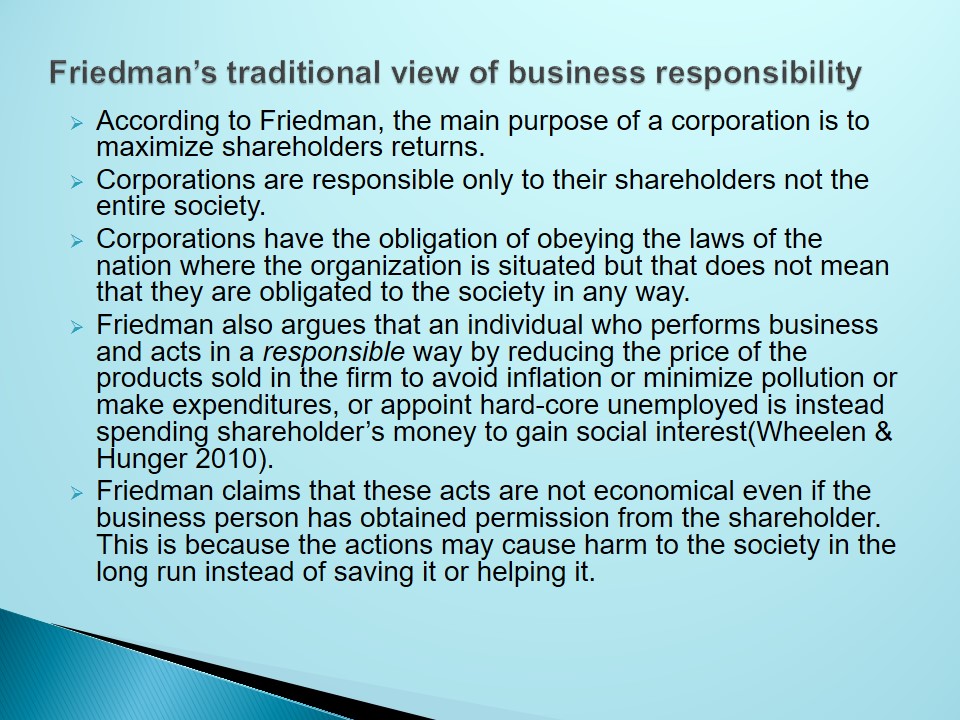
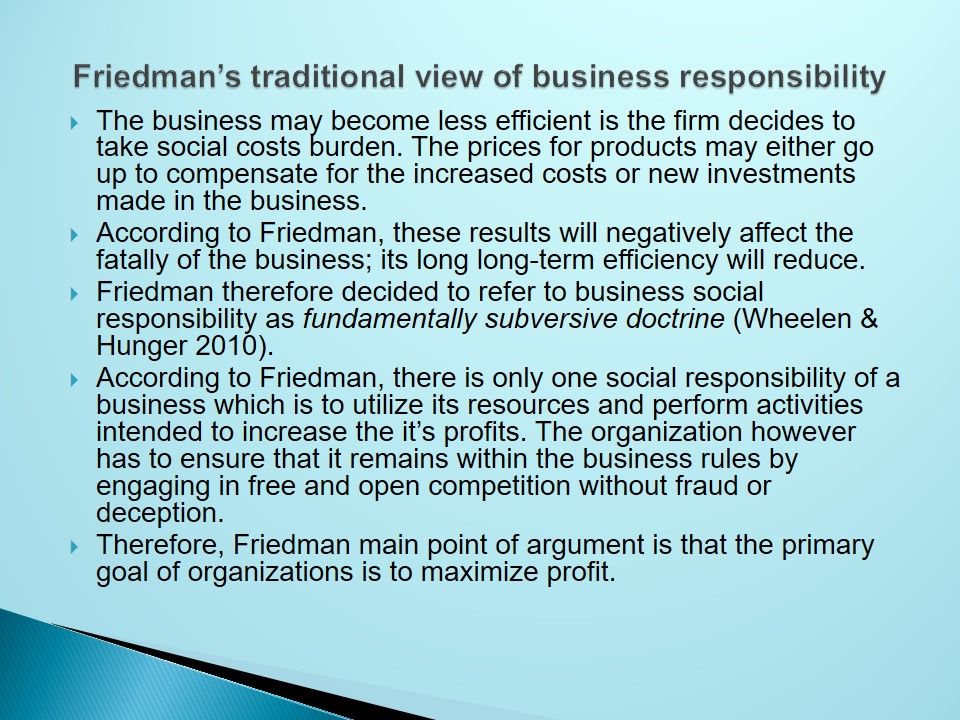
Carroll model of social responsibility
- According to Carroll, organizational managers have four major responsibilities which include: economic responsibility, legal responsibility, ethical responsibility and discretionary responsibility.
- However, the main social responsibility of organizations according to Carroll is ethical responsibility and discretionary responsibility.
- According to Carroll, the economic responsibilities of a business organization’s management are to produce valuable goods and services to the society in order to enable the firm to repay back its shareholders and creditors (Carroll & Buchholtz 2006).
- The economic components include:
- Maintaining high operational efficiency level;
- Maintaining strong competitive position;
- Being profitable;
- Operate in a way that will enable consistency with maximum share earning.
- Legal responsibilities require the organization to abide by the law set in the nation where it is operating.
- Legal responsibilities are defined by the government in laws that organizations should obey.
- The law gives the society a set of standards codes which organizations are bond to and should respect them.
- Ethical responsibilities of a business organization’s management are to obey and trail the beliefs concerning the societal behavior.
- The organization should act and behave in an ethical way to avoid causing harm to the society based on their actions.
- According to Carroll, a firm can fulfill its ethical responsibilities by conducting actions valued by the society even though are not set in government law.
- Discretionary responsibilities are voluntary obligations that a company performs (Carroll & Buchholtz 2006).
- The firm should act as a good corporate by making contributions to the society in which it operates.
- Good examples of discretionary responsibilities that organizations can perform include: building a day care center and training hard-core unemployed personnel in the society it operates.
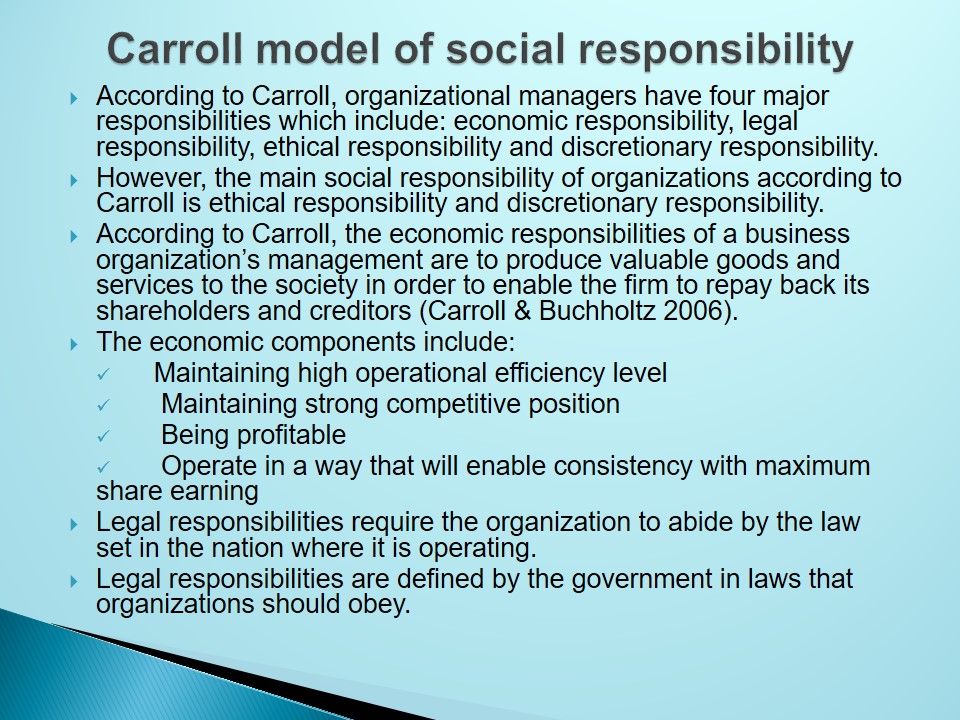
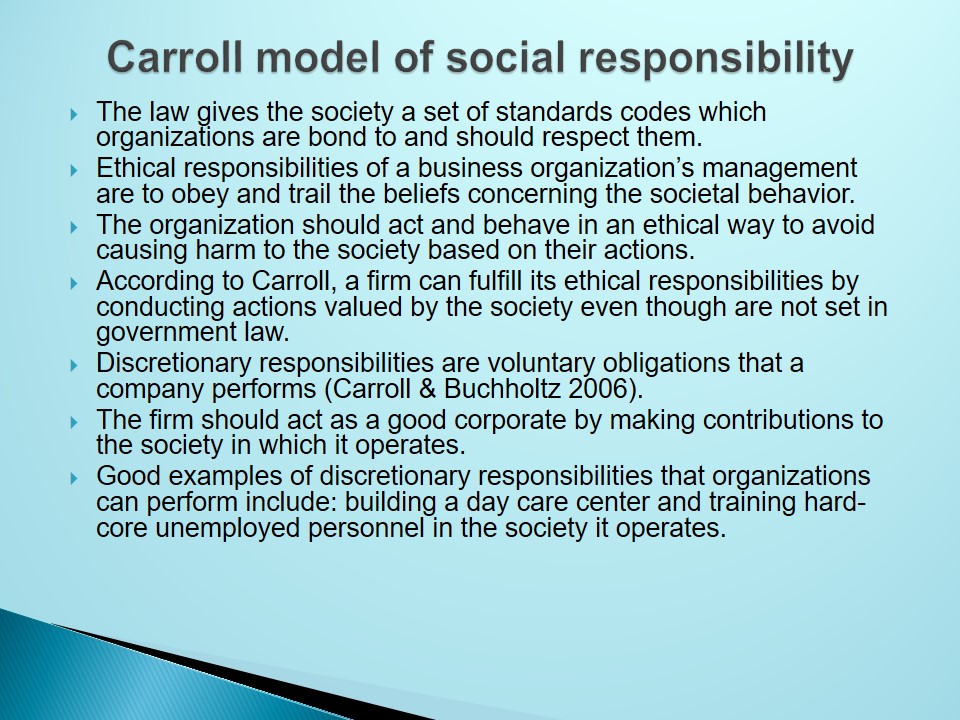
Application
The principal I would apply or implement at my current place of work or where I would wish to work in future is Carroll’s principal/model of social responsibility.
This is because the principle handles four responsibilities unlike Friedman’s principle which argues that the primary goal of an organization is to maximize profit.
According to Carroll principle, the business has the initial obligation of making profit to fulfill its economic responsibilities. However, in order to continue operating, the firm has to follow the set laws by the government in order to fulfill legal responsibilities.
After fulfilling legal and economic responsibility, that is when a firm can fulfill its social responsibility which includes ethical and discretionary responsibility. The firms ethical responsibility will be to conduct actions that bring value to the community yet not available within the government laws. After fulfilling ethical responsibility, the firm can then put their focus on discretionary responsibility which involves volunteering services such as training to the society (Carroll & Buchholtz 2006).
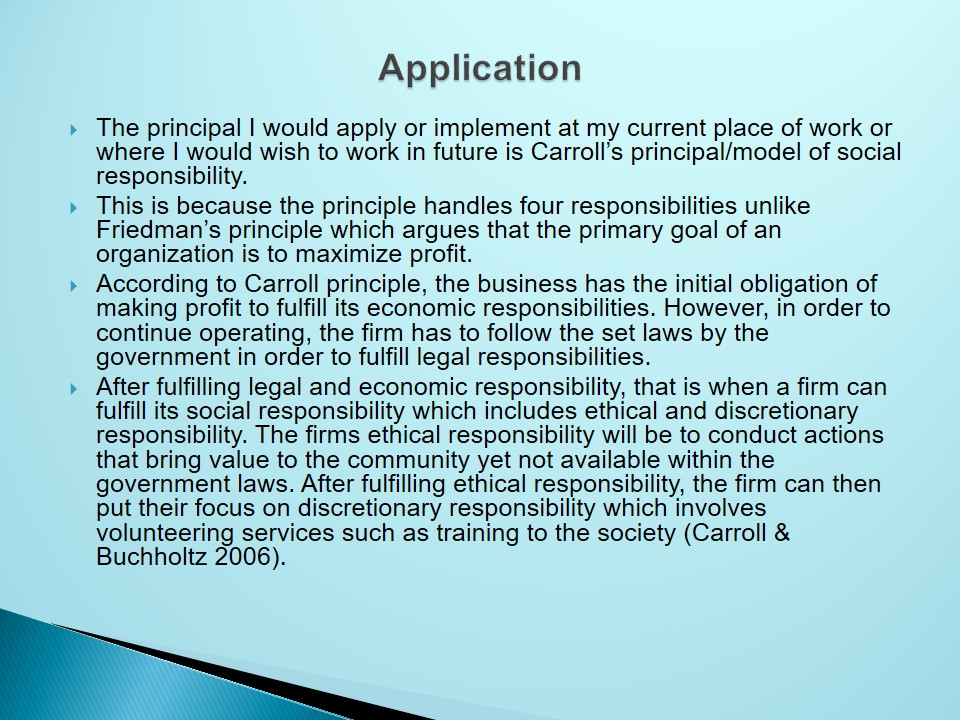
Organizations applying Friedman’s theory
- Examples of organizations that apply Friedman’s theory of social responsibility is McDonald Corporation and Royal Dutch Shell.
- This is because the two corporations exist mainly to maximize profits but are not able to advance the societal interests.
- McDonald Corporations and Royal Dutch Shell claims to be promoting social responsibility but are only committed to obtaining sustainable development. They engage in practices that bring harm to the public.
- Despite beefing up its social responsibility program associated to environmental and labor practices, however, McDonald companies have continued producing high cholesterol foods which is not healthy to public. Their foods are also highly rich in fats which increase the risk of contracting heart diseases.
- In the U.S. 86% of the population is obese due to consuming foods highly rich in fats and cholesterol. This has increased the risk of heart diseases in the nation.
- Employees working in McDonald’s Restaurants across the world are poorly paid and the working condition is also poor. This shows that the company is mainly interested in making profits hence do not care about its workers and the society at large.
- Royal Dutch Shell on the other hand despite having a much publicized social responsibility policy and being a pioneer in triple bottom line, the company has been involved in several scandals pertaining to its oil reserves.
- In 2004, Royal Dutch Shell oil reserves caused serious damages which destroyed the company’s reputation in the society it was serving.
- This shows that despite obeying the laws of the nation where McDonald Corporation and Royal Dutch Shell is situated, the two companies has clearly shown that they are not obligated to the society in any way especially when it comes to environmental and health obligations.
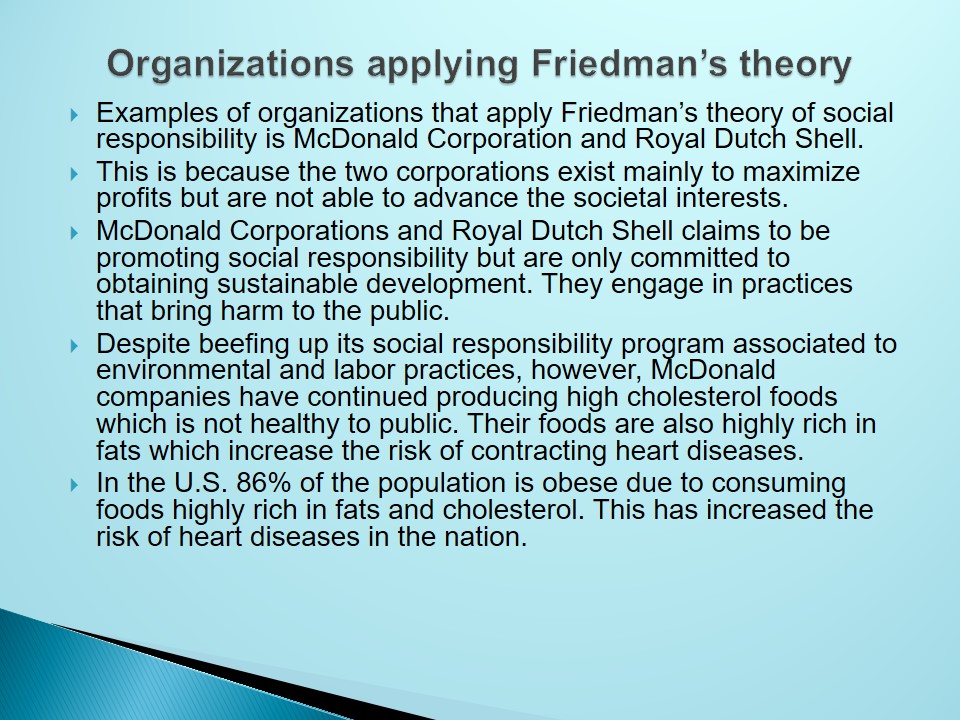
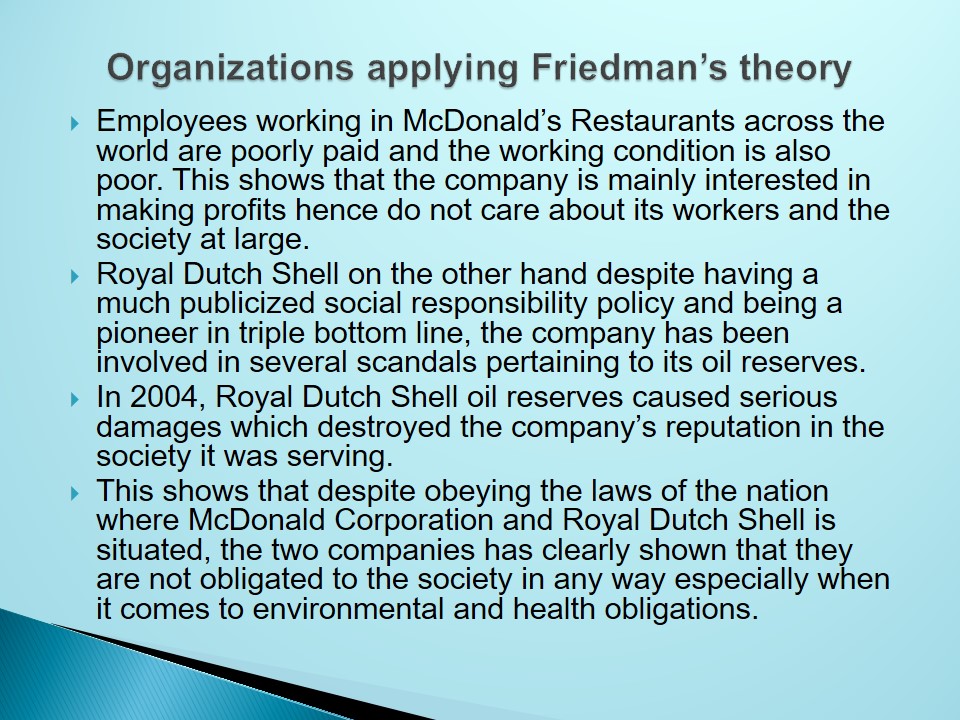
Organizations applying Carroll’s theory
- Examples of organizations applying Carroll’s theory of social responsibility are Cisco Systems and Starbuck Corporation.
- Cisco System is committed to promoting an inclusive, collaborative, diverse and innovative environment that benefits its shareholders, customers and employees.
- Cisco’s power to network allows it to increase its impact in the community from linking the world, to improving healthcare and education. This has helped in promoting energy efficiency and helped people to work smarter through collaboration.
- Cisco social responsibility such as ethical responsibility is to create environmental sustainability in its business processes and functions.
- Cisco Corporation offers free advices to its consumers on ways to reduce their rate of energy consumption.
- Cisco corporate social responsibility is to provide long term value to its customers, shareholders, employees and social investments.
- On the other hand, Starbucks aims at promoting sustainable environment by offering environmentally friendlier business to the consumer.
- Other ways in which Starbuck conduct its ethical responsibilities is by reducing store garbage bags, reducing the paper napkin size and reducing their solid waste production.
- Starbuck also promote recycling of its food packages to promote environmental sustainability.
- Starbuck conducts fair trade for its products such as coffee and beans. It obtained a licensed certificate in 2006 to conduct fair trade.
- Starbuck promotes its discretionary responsibility through its ethos water project. The company is usually this project to help children obtain clean water for drinking and usage.
- Starbuck is selling the water at a lower price which is affordable by everyone.
- Funds obtained from selling Ethos water is used to finance clean water project in those nations that are under-developed.
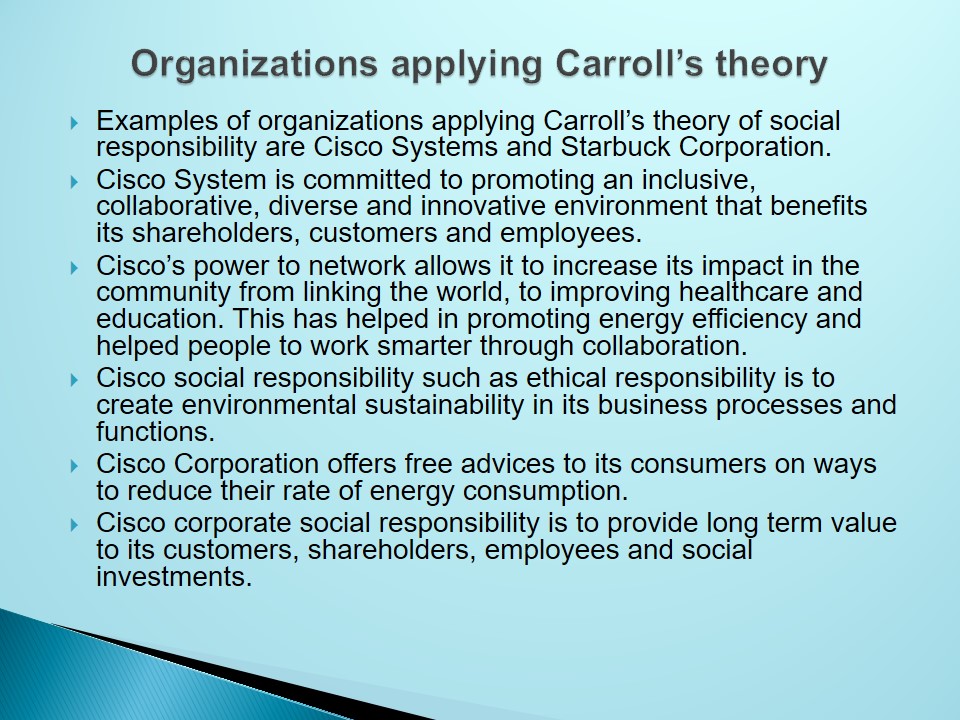
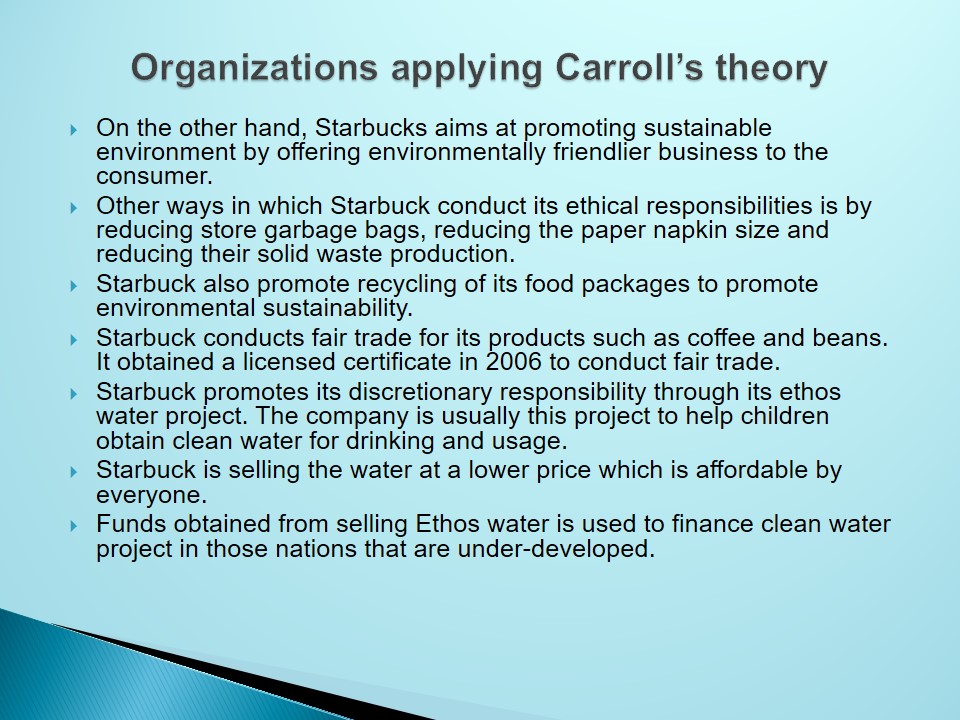
References
Carroll, A. & Buchholtz, A. (2006). Business and Society: Ethics and Stakeholder Management. Mason, OH: Thomson/South-Western Publishers.
Wheelen, T. & Hunger, D. (2010). Concepts in strategic management and business policy. New Jersey: Pearson Prentice Hall.